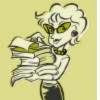 Carmi, Daniella. 2000. SAMIR AND YONATAN. New York, NY: Scholastic Press. ISBN 9-780-4391-3504-7
Carmi, Daniella. 2000. SAMIR AND YONATAN. New York, NY: Scholastic Press. ISBN 9-780-4391-3504-7PLOT SUMMARY
In this 2001 Batchelder Award winner, a young Palestinian boy must go to the Jewish hospital for surgery. Samir has shattered his knee and only through a connection with his mother’s employer is he able to get a “special permit for an operation at the Jews’ hospital.” Though he dreads going to the hospital, Samir has experiences unlike any he has had in his village. A fellow patient, Yonatan, teaches Samir about space and they develop a friendship which will impact Samir for the rest of his life.
CRITICAL ANALYSIS (INCLUDING CULTURAL MARKERS)
SAMIR AND YONATAN begins as a story about the Palestinian-Israeli conflict. A boy from the occupied West Bank, Samir fears Jews and blames them for his brother’s death. However, Samir takes a journey—not just a physical journey to the hospital, but also an emotional journey to a place of understanding, tolerance, and acceptance. Carmi uses setting and characterization to craft these journeys.
The setting varies in SAMIR AND YONATAN. Samir spends much of the book in a children’s ward in the Jewish hospital. This hospital is clean and quiet. Samir notes he would be able to concentrate better at school were it equally as quiet. This calm, bright atmosphere is juxtaposed with Samir’s village. As he lays in his hospital bed, Samir recalls the blackouts, curfew, hunger, and poverty of his home. Despite the difficulties, the familiarity comforts him, “If there’s a curfew I won’t…have to travel with Mom to the Jews’ hospital.”
Carmi’s use of characterization successfully shows Samir’s growth and acceptance of the people around him. He begins to draw connections between the people at the Jews’ hospital and his family and friends back home. This evolution can be seen in how Samir refers to the other characters. For example, a maternal figure in the story, his nurse is initially referred to as “the fat nurse.” Later, she is called Nurse Vardina. Finally, Samir refers to her simply as Vardina. Throughout the course of the story, Yonatan, an Israeli boy, becomes Samir’s friend. Often Samir does not understand Yonatan. However, the two develop a connection which has more to do with being boys than with the war-torn time in which they live.
The most drastic evolution is in Samir’s relationship with Tzahi. Tzahi is a rambunctious patient who runs around and boasts that his brother is a paratrooper. When given candies by his brother, Tzahi taunts the other children by eating them one by one and not sharing. He rarely looks at Samir, much less does he address him. Throughout the story, Samir’s view of Tzahi as “the other”—to be feared and mistrusted—evolves to a feeling of camaraderie. In the end, each boy accepts the other as a friend as together they share one last mischievous event before Samir is discharged from the hospital.
Carmi includes many cultural terms throughout the book. Originally published in Hebrew, the use of vocabulary such as pasha, dinars, kinnar, and narghile is to be expected. Inclusion of these words in the English translation keeps the cultural references in the forefront of the reader’s mind. A glossary defining non-English words is provided at the end of the book.
While this story is clearly set in Israel, the character growth could be generalized to cultural conflicts around the globe. Seeing groups as “the other” rather than inhabitants of the same planet allows fear and mistrust to fester. By living with each other, the children at the hospital discovered the common ground on which they stood. The frailty of human life is illustrated through the different ailments suffered by the patients in SAMIR AND YONATAN. Carmi’s facility for storytelling reveals that neither group is immune to this frailty nor are the children alone or forgotten in their suffering.
REVIEW EXCERPTS
Publisher’s Weekly notes, “A Palestinian boy comes to terms with his younger brother's death by an Israeli soldier in this slow-paced but affecting novel originally published in Hebrew in 1994.” (April 2002)
“The bitter suffering of a Palestinian family is at the center of this moving novel, eloquently translated from the Hebrew. ... {This is a} moving drama of individual kids who become friends and help each other through pain when they get a chance to know each other.” (Booklist, 2000)
Reviews obtained from Follett Library Resources and accessed at:
http://www.flr.follett.com/search?SID=c211074453f514ff63ced2a0fe154f24
and Book Review Digest Plus (an HW Wilson database).
CONNECTIONS
Other Batchelder Award Winners:
Delacorte Press for The Pull of the Ocean written by Jean-Claude Mourlevat and translated from the French by Y. Maudet. (2007)
Arthur A. Levine Books for An Innocent Soldier written by Josef Holub and translated from the German by Michael Hofmann (2006)
Delacorte Press/Random House Children's Books, for The Shadows of Ghadames by Joëlle Stolz, translated from the French by Catherine Temerson. (2005)
Children’s books on Israel & Judaism:
Waldman, Neil. 2003. The never-ending greenness : we made Israel bloom. Honesdale, PA : Boyds Mills Press. ISBN 978-1-59078-064-0
Oberman, Sheldon. 2005. The always prayer shawl. Honesdale, PA : Boyds Mills Press. ISBN 978-1-59078-332-0
Krensky, Stephen and Greg Harlin (Ill.). 2006. Hanukkah at Valley Forge. New York: Dutton Children’s Books. ISBN 0-525-47738-1

1 comment:
türk porno
Post a Comment